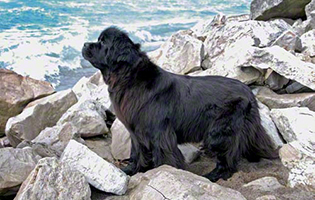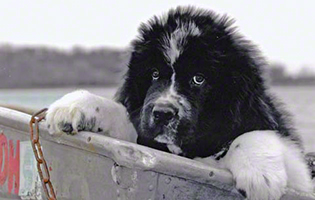There are a number of online resources that discuss first aid kits and practices, including articles on the Red Cross and AKC web sites. And, there are dog first aid kits offered by both of these organizations which can be purchased online. So, rather than re-write a similar article, with this Short Topic, what we will cover is what materials or issues may be unique to Newfoundlands, including items that are not common to most first aid kits.
First, and this is also underscored on the AKC page, the most important step in being able to manage your dog in an emergency is prior training and socialization. Dogs can be traumatized and disoriented in an emergency situation, but a well-trained dog has a better chance of being cared for. For a situation where emergency workers are involved, such as a vehicle accident, law enforcement officers may be required to terminate a dog that becomes vicious or uncontrollable, for the protection of the emergency staff and to allow them to tend to other injuries. A dog that is restrained securely in a strong crate will be safer in that situation.
Next, prior training in first aid practices can be a good asset. Some Red Cross facilities provide pet first aid training. There is also a book published by the Red Cross on Dog First Aid. To learn about their schedule, contact your local Red Cross office. Veterinarians can also teach you some basic first aid skills.
The Kit: In addition to the kits that can be purchased, you can also set up your own kit. There are several online resources that provide lists for first aid kits, including the a list from the Red Cross and one from the AKC Canine Health Foundation. Special considerations for a Newfoundland may include GasX, in the event that symptoms of bloat are caught early enough for the dog to swallow, portable electric trimmers and heavy plastic trash bags to hold ice in the event of a heat crisis. An item that may not be routine for most kits which can be a crucial, life-saving device when a Newfoundland is choking on a tennis ball is a corkscrew.
A good place to write your veterinarian’s emergency number and the ASPCA number for emergency poison information, (888) 426-4435, is in permanent marker under the lid inside the first aid kit. Be sure to store your kit in an easily accessible location.
Other Emergency Supplies: The nylon leashes in some emergency kits may be useful, but if you need to secure a dog outside of its crate during a vehicle emergency, it is better to have a chain leash or steel cable. Newfoundlands can chew through a nylon leash in a matter of seconds. Bolt-cutters are a good item to include in the travel tools for releasing a dog if needed. Also, for travel, a battery powered fan and solar blankets will help reduce heat stress should a vehicle break down during travel in warm weather. Plenty of water is always a travel essential. Water can be sprayed onto the dog using a spray bottle to increase cooling, provided that the humidity is not excessive. For more information on travel preparation, see Travel with Newfs.
Emergency Information Packet: Who is to be contacted should a problem occur that would leave you unable to take care of your pets? Including this information, along with photos and identification information, a list of any medications and your veterinarian’s contact information in a water-tight container, such as a heavy-duty Ziploc bag with a brightly colored cover stating “EMERGENCY INFORMATION” and taping this in a visible area inside your vehicle is a good practice. It is also a good idea to keep a duplicate copy in your home in an easily visible area. You may also want to make arrangements that would allow someone access to your home to care for your pets should anything prevent you from returning on schedule.
Disaster Preparation: The NCA has developed a good disaster checklist to help pet owners prepare in advance for their pets in emergency situations such as natural disasters.


Clicking each link will allow you to purchase the item through Amazon.com, commissions earned from each sale benefit the NCA Newfoundland Health Challenge and the NCA National Newfoundland Rescue Network.